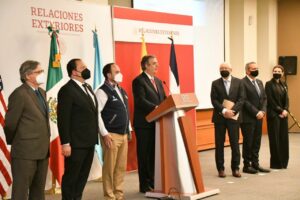MEXICO CITY – High-level delegations from Mexico and the United States on Friday outlined a new security framework between nations that, at least conceptually, marks a departure from the mindset that has guided their collaboration over the past decade.
The so-called U.S.-Mexico Bicentennial Framework for Security, Public Health and Safe Communities is designed to go beyond the 13-year-old Merida Initiative, which focused on building Mexico’s crime-fighting capabilities and rule of law projects.
“The time has come for a comprehensive approach to our security cooperation that sees us as equal partners in defining our common priorities, addresses the causes of these challenges such as inequality and corruption, and focuses not only on strengthening law enforcement, but also on those Public focused. “Health, the rule of law, including economic opportunities,” said US Secretary of State Antony Blinken on Friday.
The Mexican Foreign Minister Marcelo Ebrard put it more succinctly: “Goodbye Merida, welcome to the bicentenary.”
“The first major difference is that, from Mexico’s point of view, the Merida initiative focused on the thesis that the cartel capos had to be captured and that was enough,” said Ebrard. Now they see that that is not enough, that there is a need to pay attention to expanding youth opportunities and treating addiction, he said. “Success will be measured in fewer homicides in Mexico and less drug use.”
This shift in emphasis is in line with President Andrés Manuel López Obrador’s refrain “Hugs instead of bullets” and his declared disinterest in persecuting the leaders of the Mexican cartels.
The joint statement by the two governments gave significant room to the treatment of drug addiction – particularly opioids – and its impact on society in the context of public health, which is a marked departure from Merida’s emphasis on the criminal justice system.
The US pledged to devote more resources to identifying and treating opioids, and Mexico pledged to work with the United Nations to launch a program to better manage shipping containers to limit imports of chemical precursors to synthetic drugs like fentanyl.
Mexico confiscated an estimated 1.3 tons of the synthetic opioid last year. In the same year, the US recorded 93,000 drug overdose deaths.
Governments have pledged to target importers of chemical precursors to fentanyl and methamphetamine, their financial networks and secret laboratories.
They also said they would work together to reduce the arms trade, which is a high priority for violent Mexico, and give youth more opportunities to make it harder for criminal organizations to recruit.
“We need to deal with violence, dismantle transnational criminal organizations and focus on prevention in order to create the conditions for a culture of peace as we work hand in hand on the root causes of crime.” Statement said.
Mexico’s Secretary of State for Public Security, Rosa Icela Rodríguez Velázquez, said: “For many years the issue of Mexican security has been approached from the point of view that it is measured only by the use of force. Social programs, intelligence and coordination, men and women hear in theirs Cities, towns and communities too. “
Immigration is expected to be a central theme of the dialogue. López Obrador has been saying for months that Mexico can’t just keep detaining migrants and trying to contain them in the south of the country, far from the US border.
He has asked the U.S. government to invest in two of his signature social programs to ease economic pressures on people to migrate. The Biden government needs Mexico’s continued cooperation to manage the flow of migrants to the US border.
The U.S. also needs to find a way to resume the controversial Trump-era policies that led asylum seekers to await their cases in Mexico. As part of the so-called migrant protection protocols, tens of thousands of asylum seekers waited in dangerous Mexican border towns for their cases to progress. Biden had made the repeal of the policy one of his first business orders when he took office, but the Supreme Court ordered its re-implementation. Ebrard said the issue was not discussed on Friday.
Mexico is also pushing the US government to do more to prevent the inflow of illegal weapons from the US.
Both sides were also expected to discuss the role of US agents in Mexico and the exchange of information. Governments insist that their security agencies work closely together on a daily basis. But after the US arrest of Mexican Defense Minister Salvador Cienfuegos and his release following the loud protests of Mexico, tensions persist.
Cienfuegos was arrested after being secretly indicted by a federal grand jury in New York in 2019. He has been accused of conspiring with the H-2 cartel to smuggle thousands of pounds of cocaine, heroin, methamphetamine and marijuana while serving as Secretary of Defense from 2012 until 2018.
With Cienfuegos back, Mexico said it would conduct its own investigation, but it was quickly closed. López Obrador attacked the US prosecutor’s case against the general, accusing the Drug Enforcement Administration of fabricating the case.
Mexico has restricted US agents working in the country and lifted their diplomatic immunity.
At breakfast with both delegations on Friday, López Obrador said: “It would be very regrettable if we did not understand each other, if our cooperation, the friendship between our governments and our peoples were not strengthened.”
A three-year plan should be available by the end of January.












/cloudfront-us-east-2.images.arcpublishing.com/reuters/JEUL2B5V7BJCFMRTKGOS3ZSN4Y.jpg)



/cloudfront-us-east-2.images.arcpublishing.com/reuters/DYF5BFEE4JNPJLNCVUO65UKU6U.jpg)

/cloudfront-us-east-2.images.arcpublishing.com/reuters/UF7R3GWJGNMQBMFSDN7PJNRJ5Y.jpg)












